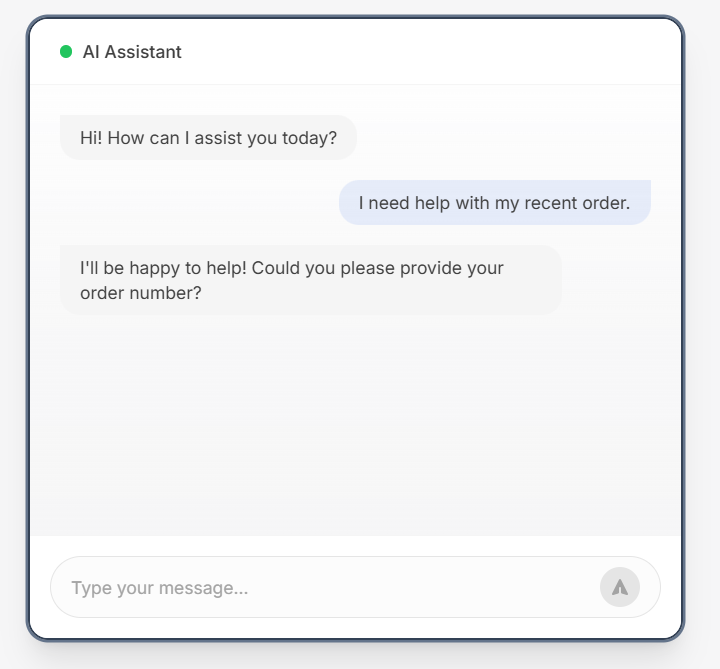
AI Chatbot Platform for Ecommerce: Top 5 Picks in 2025

Running an ecommerce store can be quite demanding. You’re juggling inventory, answering customer questions, processing orders, and trying to keep everyone happy — it eats up time fast. So how do you keep up with it all without letting your service slip?
If you're not leveraging chatbots, you're missing a significant chance to enhance your online store. Chatbots are intelligent website virtual assistants that take on these everyday tasks that slow your daily operations. They can instantly answer customer questions, manage orders and returns, and operate around the clock. So, why would anybody stick with outdated methods?
We'll look at how AI chatbots can take some of the friction out of running an ecommerce store and make it easier to keep customers happy. Then we'll go over five solid chatbot options worth checking out. For a ready-to-deploy option, explore our ecommerce chatbot solution designed specifically for online retailers.
How Chatbots for Ecommerce Businesses Work#
An AI chatbot uses artificial intelligence to communicate with customers conversationally. These customer service chatbots are designed for ecommerce sites (online retailers), stepping in to help shoppers while they browse and buy.
AI-powered Chatbots act as intelligent virtual assistants providing instant responses to help guide online shoppers through shopping and recommending products based on user interactions. Ecommerce chatbots analyze user input to generate appropriate responses. Customers can type their queries into the chatbot when they visit an online store with questions or need help.

It uses natural language processing (NLP) and machine learning to understand and recognize the words and phrases in the question and determine the customer's intent. Once the chatbot understands the query, it processes this information to find the best response. It can pull from stored details like FAQs and past conversations to give an answer that actually fits the question.
If the question is more complex or beyond the chatbot's current knowledge base, it can seamlessly transfer the conversation to a human agent who can provide further assistance.
Key Features of an Ecommerce AI Chatbot#
Understanding what features make ecommerce chatbots useful is important for making the most out of them. The best chatbot platform should make it easy for customers to get what they need without feeling like they’re talking to a machine. When it can handle complex customer queries and fit into your existing setup, the whole buying process feels smoother for everyone.
Understanding Natural Language#
A great AI chatbot needs to understand your customers' questions, even if they don’t phrase them perfectly. Using NLP, chatbots can pick up on what people mean, not just specific keywords. It makes the interaction feel less like dealing with 'just a chatbot' and more like a real, human conversation. When conversations flow that way, customers walk away more satisfied and are more likely to make a purchase.
Making Conversations Personal#
Modern AI ecommerce chatbots can make conversations feel more personal. They can remember details from past purchases or browsing history and use that info to suggest products that fit each customer’s taste. If someone often buys fitness gear, the chatbot might recommend the latest sneakers or workout clothes.
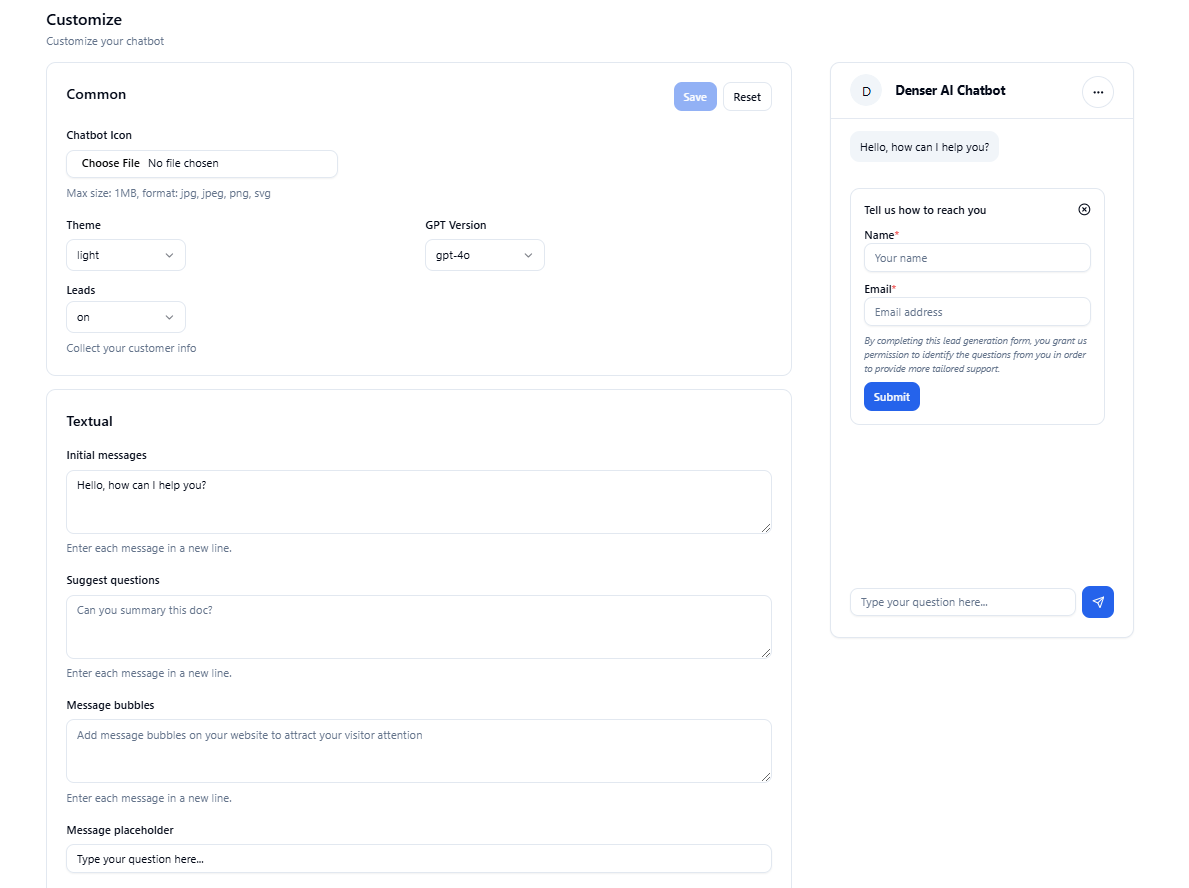
Providing a personalized customer experience can help boost your sales because customers who feel valued are more likely to buy products that feel handpicked for them and will come back for more.
Working on Multiple Platforms#
People shop on plenty of platforms—your website, Instagram, Facebook, and even messaging apps like WhatsApp. An intelligent AI chatbot should be able to assist customers across any of these platforms. For instance, let's say a customer begins to inquire about a product on your Facebook page before moving over to your website. The chatbot flows should be able to follow that conversation, so customers don’t get annoyed repeating themselves.
Learning and Improving Over Time#
Unlike basic bots that follow scripts, AI ecommerce chatbots can improve over time. As they handle common customer inquiries more and more, they learn to give better answers because they're continuously optimizing. If a chatbot notices it’s getting the same question repeatedly, it can figure out how to answer it more quickly and accurately in the future.
Each conversation helps the chatbot get better at what it does, from quick order tracking to more complex queries, allowing your team to have less on their plate, customers get answers faster, and boosted sales often follow.
Tracking Customer Engagement Data and Insights#
AI ecommerce chatbots can do more than just answer questions—they can also gather useful customer data. They can track what customers are asking about, which products are popular, and where customers are getting stuck.
That kind of performance monitoring insight gives you a clearer picture of what's working and what isn't. The right chatbot platform paired with advanced analytics can show you where to make smart tweaks. For a complete framework on building your chatbot marketing strategy, see our step-by-step guide.
Shopify Integration for Ecommerce Chatbots#
Shopify makes it easy for businesses to grow without getting stuck in technical work. Its drag-and-drop interface and seamless integration with AI agents let teams build complex workflows on their own.
Integrating a Shopify chatbot is straightforward and lets you seamlessly integrate support right where customers interact with your store.
Select a Compatible Chatbot App#
Choose a chatbot app that integrates seamlessly with Shopify. A highly recommended option is Denser.ai, which offers advanced AI capabilities for handling complex customer interactions and providing personalized experiences.
Sign up for free or request a demo to learn about Denser’s capabilities.
Install the App on Your Shopify Store#
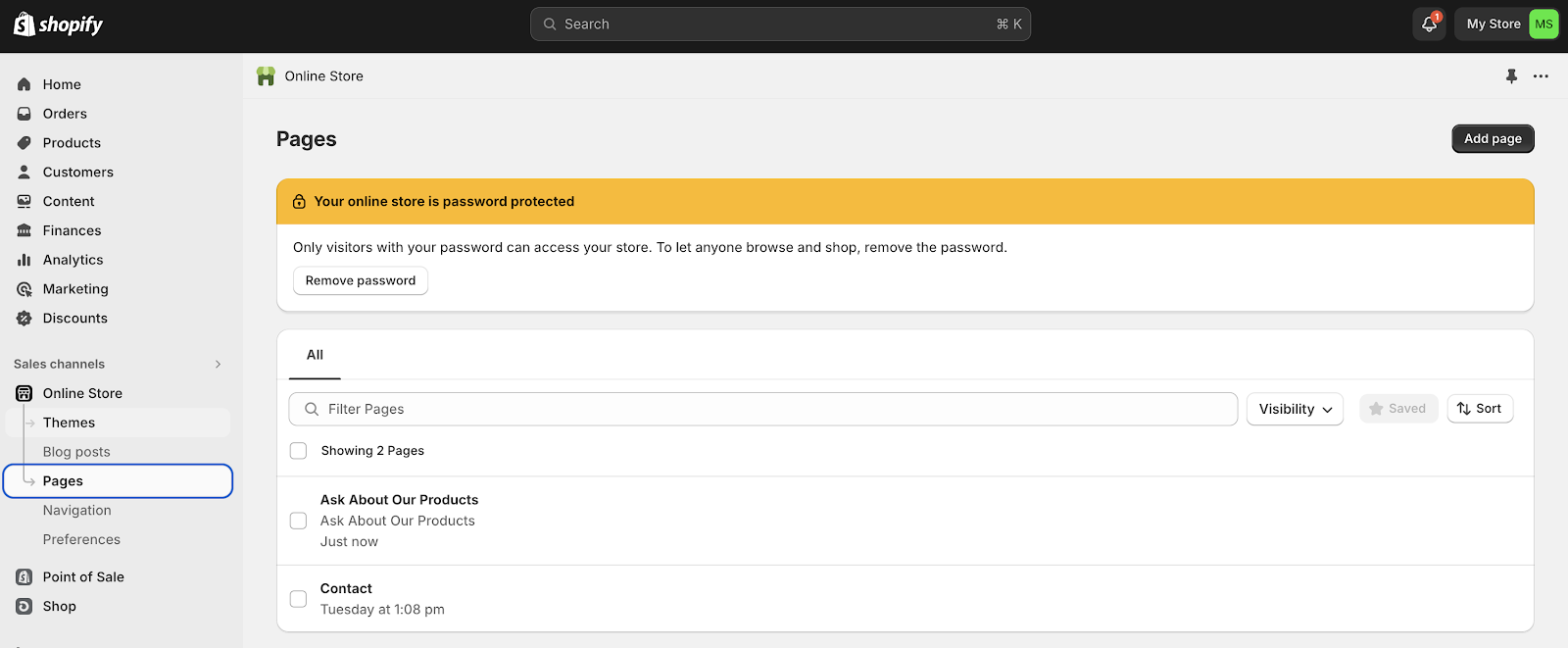
Once you have chosen Denser.ai, install it on your Shopify store. Here’s how:
- Access your Shopify account and navigate to the main dashboard.
- On the side panel, go to Sales Channels > Pages. You will see a list of the pages that make up your Shopify site. Select the page where you would like to integrate Denser's chat window. For this guide, we chose a page named "Ask About Our Products."
- On the editor for the selected page, click the </> icon on the edit bar under Content. This will display the HTML code used to construct the page.
Prepare HTML Code for Integration#
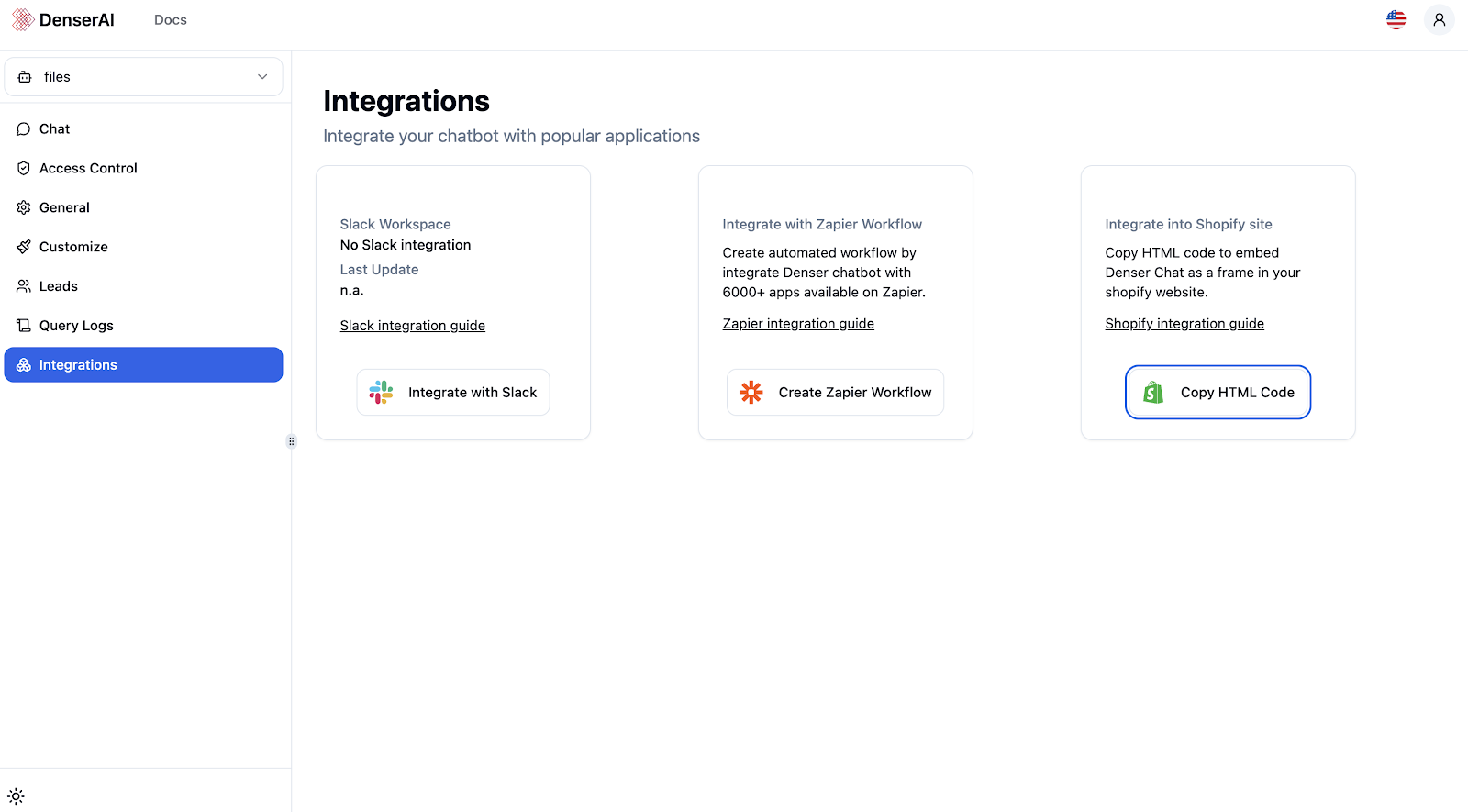
This step is performed in Denser.ai:
- On the main screen of your selected chatbot, ensure you have Integrations selected on the side panel.
- Select the "Integrate with Shopify site" tile and click the "Copy HTML Code" button to copy the code snippet to your clipboard.
Integrate Denser Chatbot as Frame#
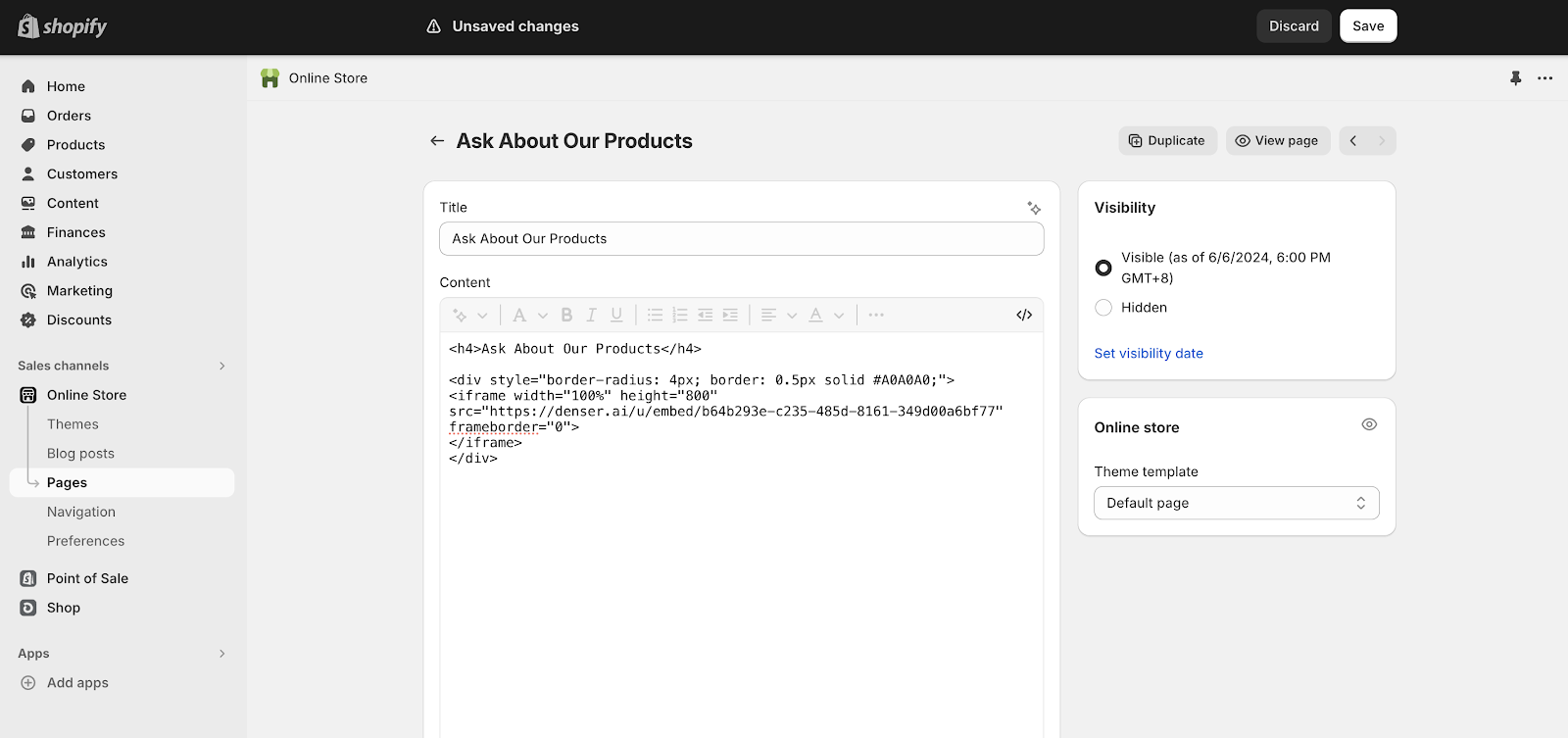
Finally, you will integrate the Denser chatbot by pasting the HTML code into your Shopify page editor:
- In the HTML editor of your Shopify page, paste the Denser <iframe> code snippet where you want the chatbot to appear.
- Save the changes and publish the page to activate the chatbot integration.
5 Best AI Ecommerce conversational AI Chatbot Platforms#
With online shopping on the rise, you need conversational AI solutions that can manage customer inquiries, automate responses, and improve ecommerce sales. The right chatbot can step in at key moments during the shopping process. It can help when a customer requests more details, creating personalized product suggestions based on user behavior, walking them through checkout, and staying available after the sale.
Here are five chatbot platforms for ecommerce that make it easier to keep things running smoothly and give customers a better overall buying journey.
| Chatbot | Best For | Features | Pricing |
|---|---|---|---|
| Denser.ai | Lead qualification and 24/7 support | AI-powered chat, multilingual, scalable | Free to $399/mo plus Enterprise (custom) plans |
| Tars | Quick setup without coding | Drag-and-drop builder, mobile friendly | Free, Premium, Enterprise |
| Customers.ai | Cross-platform lead generation | OmniChat, behavior insights | From $199/mo |
| Chatfuel | Messenger and WhatsApp engagement | No-code, real-time updates, CRM integration | From $23.99/mo |
| ManyChat | Marketing and ecommerce campaigns | Visual builder, multi-channel | Free, Pro, Elite |
1. Denser.ai#
Your business face may face increasing pressure to simplify communication and provide round-the-clock client support.
Manual inquiry handling, slow lead qualification, and delayed responses can lead to missed opportunities and lower conversion rates. Denser.ai changes that.
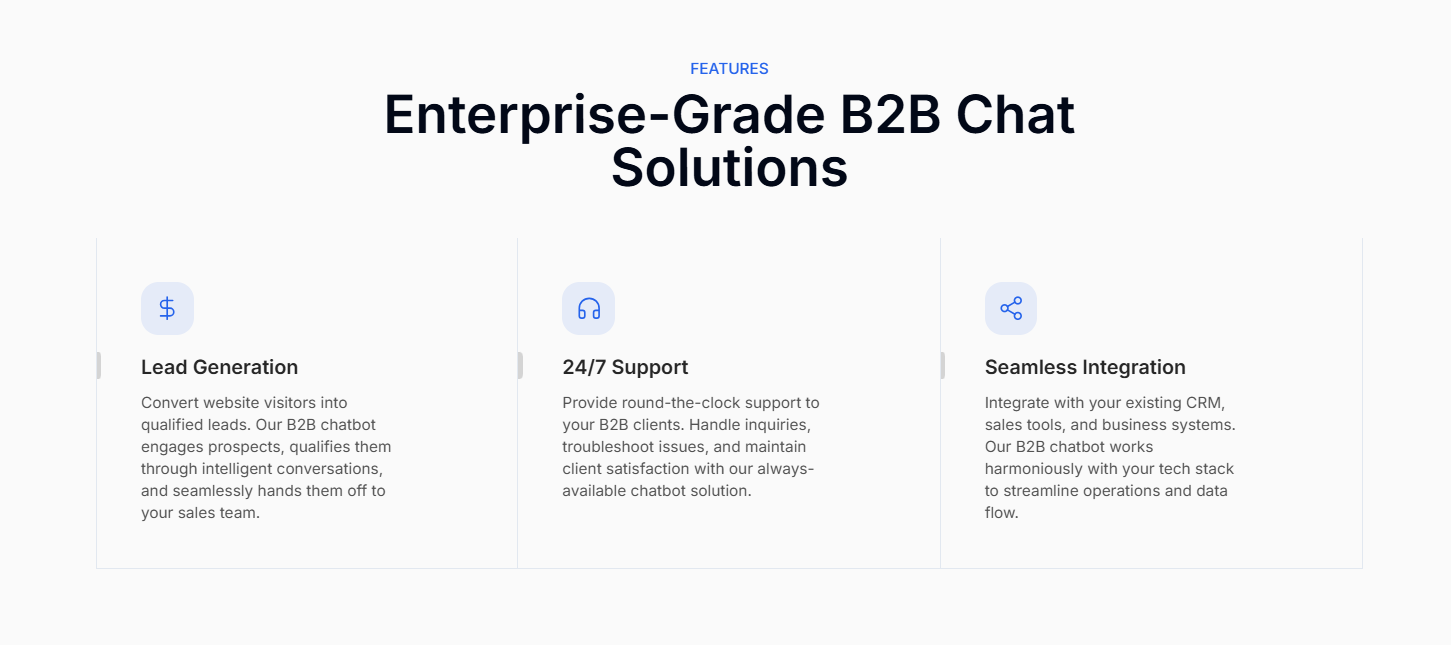
Built with advanced AI and NLP, Denser.ai is a smart, always-available chatbot that helps you convert website visitors into leads, automate customer interactions, and integrate with CRM and business tools.
Your website is your first touchpoint with potential clients. Denser.ai helps you convert passive visitors into engaged prospects through intelligent conversations.
The chatbot qualifies leads in real time, gathering key details and routing them to your sales team for faster follow-ups.
Here's why you should choose Denser.ai as your chatbot platform:
AI-Powered Conversations#
Your customers expect more than scripted responses. They want intelligent, contextual conversations. Denser.ai’s advanced NLP engine understands the meaning behind every inquiry. It provides accurate, real-time responses based on your business’s knowledge base.
Instant, 24/7 Support#
Business doesn’t stop when the workday ends, especially in industries where clients and partners operate across different time zones. Denser.ai guarantees 24/7 availability, so no inquiry goes unanswered, and no lead is left waiting.
Multi-Language Support#
If you expand into international markets, you need to engage customers in multiple languages. Denser.ai makes global communication possible with automatic translation capabilities.
Language barriers don’t slow down business growth. If you’re handling inquiries from Asia, Europe, or South America, the platform keeps the conversation flowing smoothly.
Data-Driven Insights on Conversion Rates#
Customer behavior is key to improving engagement and driving sales. Denser.ai provides detailed reports on lead conversion, customer inquiries, and chatbot interactions.
With these insights, you can refine marketing efforts, optimize sales funnels, and improve overall customer satisfaction.
Enterprise-Grade Security and Compliance#
Handling sensitive data requires the highest level of security. Denser.ai ensures end-to-end encryption, strict access controls, and compliance with industry regulations. Therefore, you can confidently manage client interactions without risk.
Scalability That Grows With Your Business#
As your business expands, so do customer inquiries. Denser.ai is built to handle thousands of conversations simultaneously without compromising speed or accuracy.
Whether you're a startup looking to automate lead generation or a large enterprise managing high volumes of customer interactions, this AI chatbot scales effortlessly to meet demand.
Denser Pricing Plans#
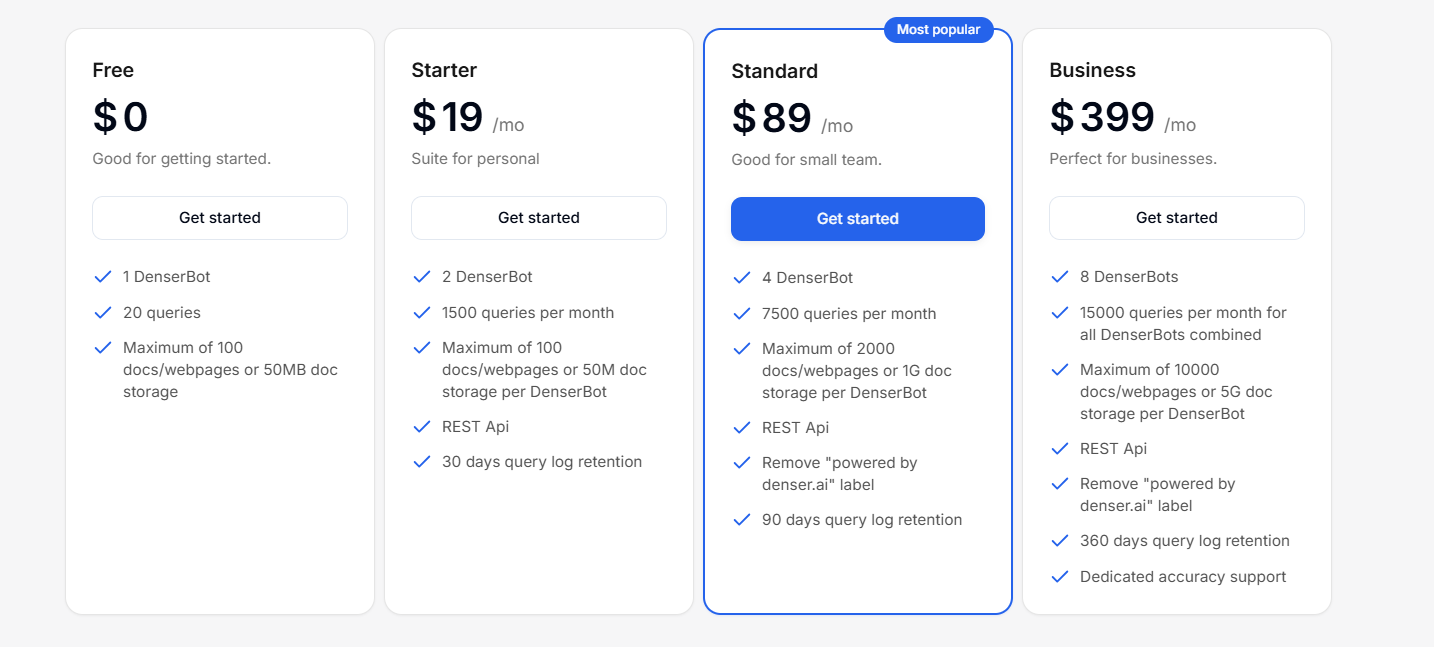
- The Free Plan includes one bot, 20 queries per month, and up to 100 documents or 50MB of storage.
- The Starter Plan costs $29/month, offering two bots, 1,500 queries, and up to 100 documents or 50MB storage per bot.
- The Standard Plan at $119/month provides four bots, 7,500 queries, 2,000 documents, or 1GB storage per bot, with API access and 90-day logs.
- The Business Plan is $399/month, with eight bots, 15,000 queries, up to 10,000 documents or 5GB storage per bot, 360-day logs, and priority support.
For custom solutions, the Enterprise Plan offers tailored features and pricing. Visit Denser.ai’s pricing page for more details.
Sign up for a free trial or schedule a demo today!
2. Tars#
Tars is known for its simplicity and ease of use for ecommerce businesses. This platform allows you to create chatbots without needing any coding skills.
You can get started with pre-built industry templates tailored to your specific business needs. The drag-and-drop bot builder is a user-friendly interface and requires no coding for easy customization of chatbots.
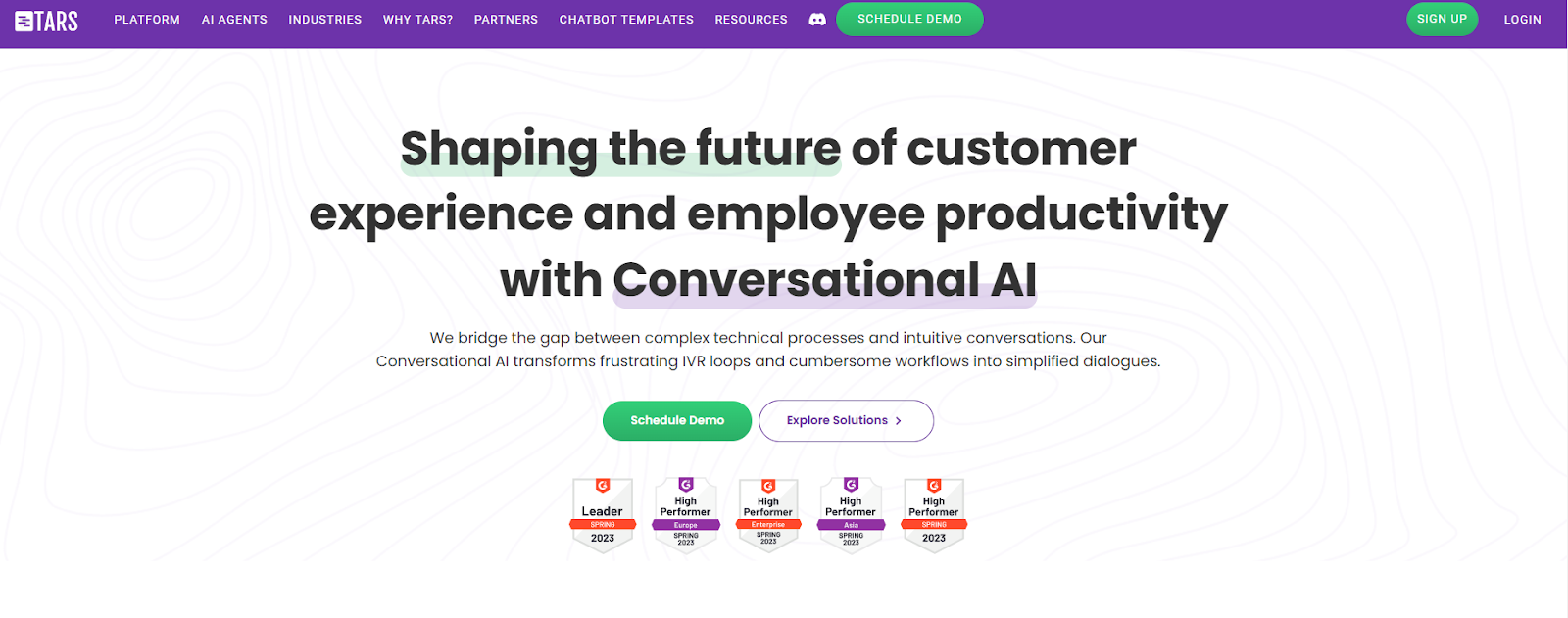
Image Source: hellotars.com
Strengths#
- Optimized for mobile users
- Intuitive and easy to navigate
- Quick and effective assistance
- Reliable and powerful software as a service product
Limitations#
- Limited ability to tweak the visual design
- Expect to invest a few hours to get fully up to speed
- Some limitations due to WhatsApp's rules
Pricing#
The Free Plan, which costs $0 per month, is ideal for individuals and researchers with up to 100 conversations per month.
The Premium Plan, priced at $500 per month, is tailored for startups and small businesses with 500 conversations per month.
For larger enterprises and public organizations, TARS offers a custom Enterprise Plan with flexible pricing and conversation limits.
3. Customers.ai#
Customers.ai, formerly known as MobileMonkey, is an AI chatbot platform that helps you find more leads and get higher customer engagement rates with AI-powered email tools.
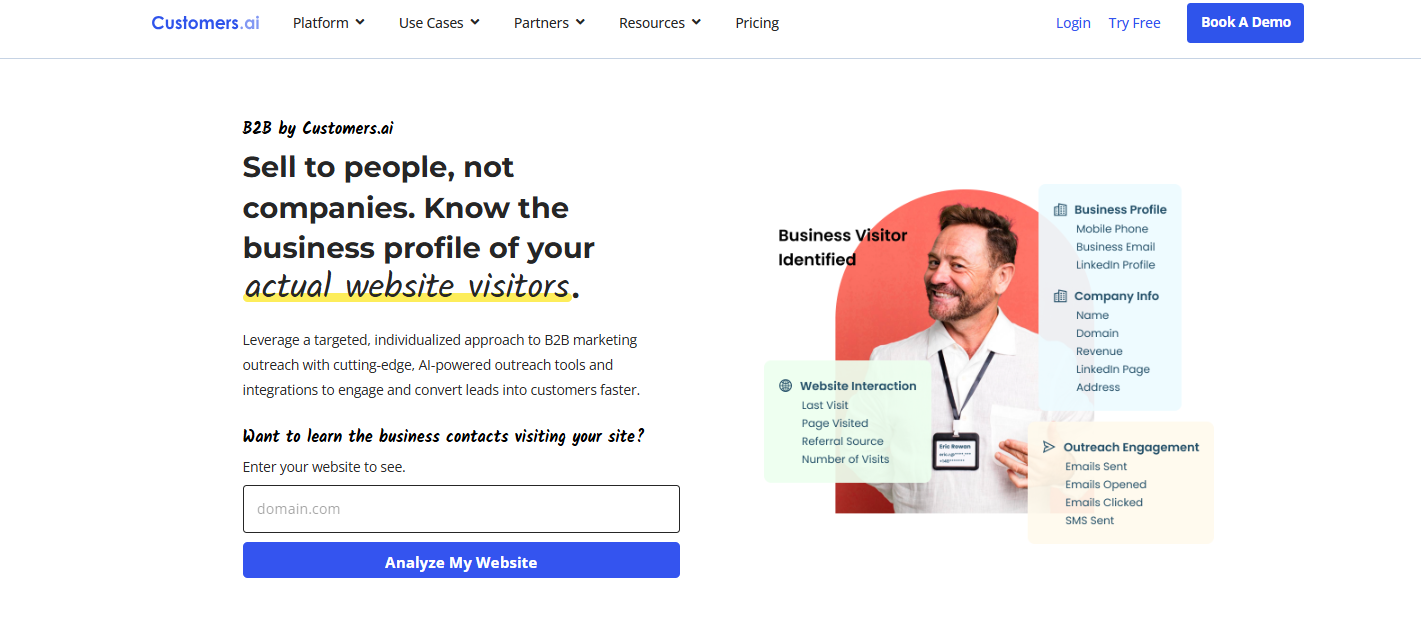
Image Source: customers.ai
One of its best features is OmniChatⓇ technology, which allows you to create one chatbot that works across different messaging platforms. You can manage all your conversations from one place using your mobile device.
Strengths#
- Accurate visitor identification
- Real-time behavior insights
- Strong lead generation
- Audience segmentation for personalization Chatfuel also offers a no-code platform that is easy to navigate
Limitations#
- Slight data update delays
- Some users found occasional data sync issues
Pricing#
- Advertising Plan: Starts at $199 per month, businesses can use it to optimize conversions from Meta and Google ads (contact for details).
- Email Marketing Plan: $199 per month, suitable for businesses centered on email campaigns.
- Combined Meta & Email Plan: Starting at $399 per month, it integrates both ad and email marketing capabilities.
- Agency Plan: Flexible pricing tailored to meet the unique needs of marketing agencies, offering fully customized solutions.
4. Chatfuel#
Chatfuel also offers a no-code platform that is easy to navigate. It connects with customers on popular platforms like Facebook, WhatsApp, Instagram, and website chats.
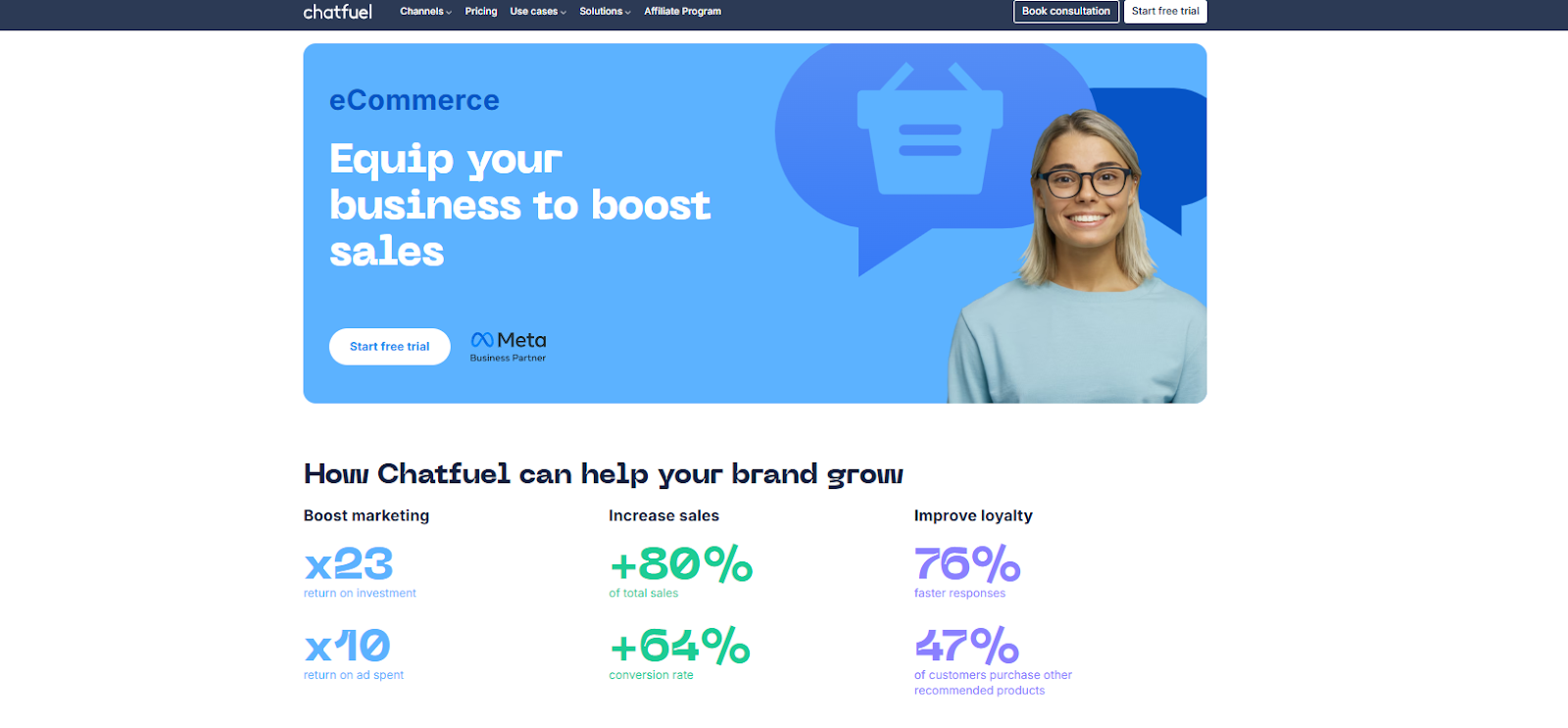
Image Source: chatfuel.com
Chatfuel provides real-time updates on how well your messages are doing, helping you understand what's working and what's not. It works with your existing computer programs and customer relationship management systems, which help automate sales processes.
Strengths#
- Fast setup and deployment
- Reliable and accessible support team
- Easily tailor the product to fit specific needs
- Direct links to helpful resources
Limitations#
- Restricted to Messenger only
- Limited complexity in chatbot capabilities
- Not entirely intuitive and may require some learning
Pricing#
- The Basic plans for Instagram and Facebook begin at $23.99 per month, covering up to 1,000 conversations, with additional costs for higher usage.
- For WhatsApp users, the business plan starts at $34.49 per month and supports 1,000 chatbot interactions.
- The Enterprise plan, priced at $300 per month, includes advanced features, dedicated account management, and bot-building services with bulk pricing options.
5. ManyChat#
ManyChat is another user-friendly ecommerce platform that excels in creating chatbots for various purposes, including sales, marketing, and customer support.
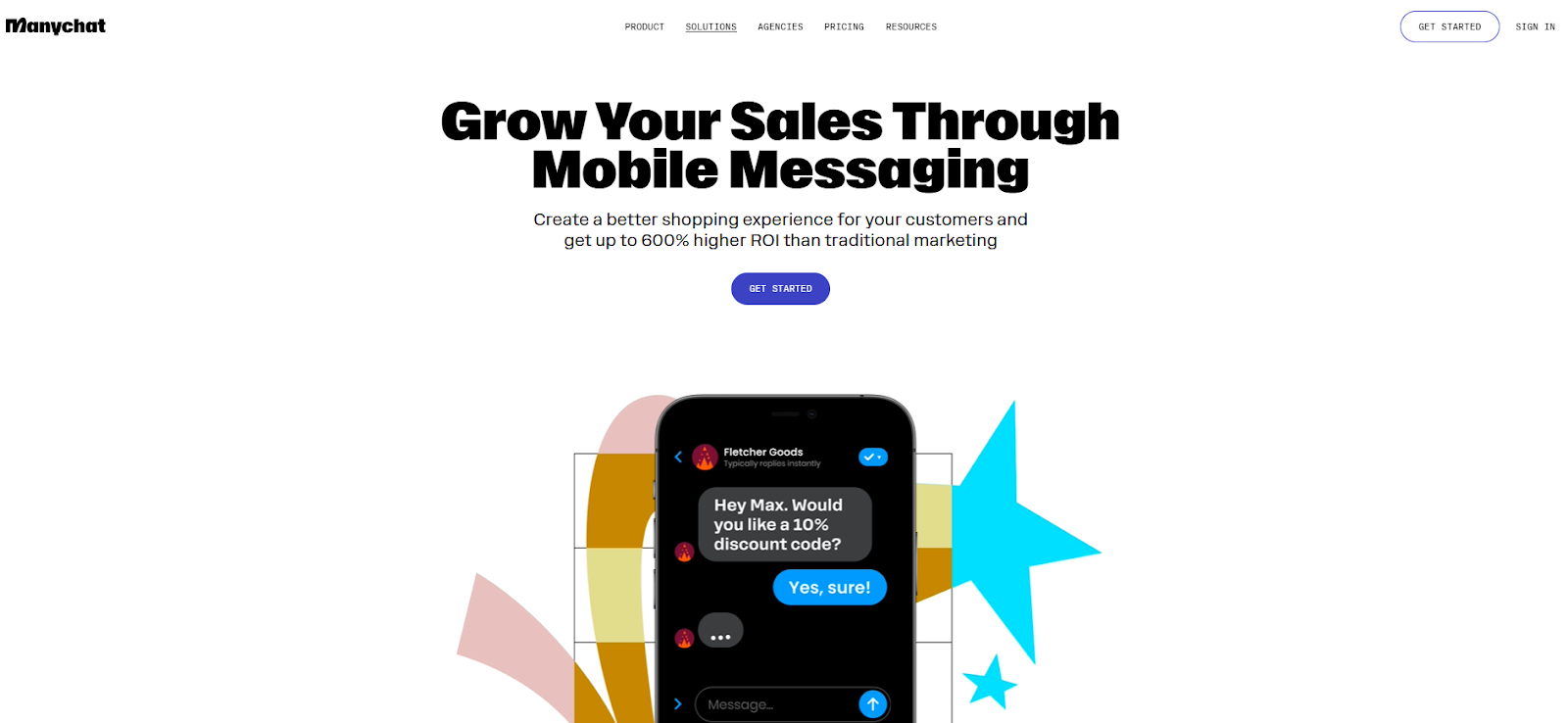
Image Source: manychat.com
It offers two interfaces: The Basic Builder, which is simple and perfect for newcomers, and The Flow Builder, which is more detailed and suitable for creating complex interactions. This setup helps users organize and visualize their chatbot conversations effectively.
Strengths#
- The visual interface makes it easy for beginners
- Multi-channel support
- Good for creating marketing campaigns
- Supports multiple platforms
Limitations#
- Lacks notifications for failed automation
- Needs a better way to see active automation
Pricing#
- The Free plan allows users to access essential features for up to 1,000 contacts at no charge.
- For those needing additional tools, the Pro plan starts at $15 per month with advanced features.
- For businesses with larger goals, the Elite plan offers custom solutions to meet specific requirements.
Ecommerce Chatbot Use Cases#
AI chatbots have a wide range of applications in ecommerce, making them a valuable asset for businesses. Here are some of the best ecommerce chatbot examples in real-world usage:
Customer Support#
Customers often have questions about products, order statuses, return policies, etc. Ecommerce chatbots can provide quick and accurate answers to these questions 24/7. This quick assistance helps reduce frustration and improve customer satisfaction.
For example, if a customer wants to know if a product is available in a particular size or color, the chatbot can quickly check the inventory and provide an answer.
Sales and Marketing#
AI chatbots play a big role in sales and marketing by engaging with customers throughout the customer journey. They offer personalized product recommendations based on browsing history and preferences.
Sales chatbots can also inform customers about ongoing promotions and discounts to encourage them to purchase.
If a customer is browsing running shoes, the ecommerce chatbot might suggest related products like athletic socks or a fitness tracker, potentially increasing the order value.
Order Processing#
They assist customers with placing orders to keep the process smooth and simple. After the purchase, AI ecommerce chatbots provide real-time updates on order status and shipping information.
If a customer needs to return a product, the chatbot guides them through the return process, making it hassle-free.
Gathering Customer Feedback#
Gathering customer feedback is also a valuable use case for ecommerce chatbots. They conduct surveys and ask for feedback after a purchase or interaction. This information helps businesses understand customers' likes and dislikes, allowing them to improve.
For example, if several customers mention having trouble finding a specific product category, the business can reorganize the website to make it more user-friendly.
Cart Abandonment Recovery#
It’s common for customers to leave items in their shopping cart without completing the purchase. Ecommerce chatbots can help reduce cart abandonment by sending automated reminders to customers.
If a customer leaves the site with items still in their cart, the chatbot can send a message saying, “You have items waiting in your cart. Complete your purchase now and get 10% off!” This gentle nudge can boost conversion rates.
Where Can Businesses Use AI Ecommerce Chatbots?#
AI ecommerce chatbots are versatile and can be used on multiple platforms to improve the customer experience. Here are some of the primary places where you can deploy these chatbots:
Websites and Mobile Apps#
Your website is the most common place to use an AI ecommerce chatbot. The chatbot can assist and engage customers with finding products, answering questions, and guiding them through the sales process.

Many ecommerce businesses also have mobile apps, and integrating an AI ecommerce chatbot into the app can make it even more user-friendly. Customers can get assistance with their shopping, track orders, and receive personalized recommendations directly within the app.
Social Media Platforms#
Conversational commerce chatbots can also be deployed on social media platforms like Facebook and Instagram.
These chatbots can engage with customers directly within the social media environment. They can also answer questions, provide product information, and even help with orders.
Messaging Apps#
Messaging apps like WhatsApp, Facebook Messenger, and WeChat are becoming increasingly popular for customer interactions. Using AI ecommerce chatbots on these platforms helps businesses to provide quick and convenient customer support.
Customers can ask questions, get updates on their orders, and even make purchases directly through the chat.
Email#
Chatbot automation can also improve email communication. Chatbots can automate responses to common customer queries, send personalized product recommendations, follow up on abandoned carts, and provide updates on orders.
This automation helps ensure customers get timely responses and relevant information without human intervention.
Upgrade Your Ecommerce Website with Denser.ai#
Is your ecommerce business stuck with outdated customer service? Denser.ai is here to improve that!
This AI chatbot platform guarantees your business is always responsive and efficient, providing exceptional service at all hours.
It integrates into all your digital touchpoints—your website, social media, and direct messaging platforms—providing customers with a consistent and personalized experience.
Setting up Denser with your Shopify store couldn’t be easier. It connects with your existing systems like CRM, inventory, and payment processes. You can now concentrate on expanding your business while it takes care of the daily interactions.
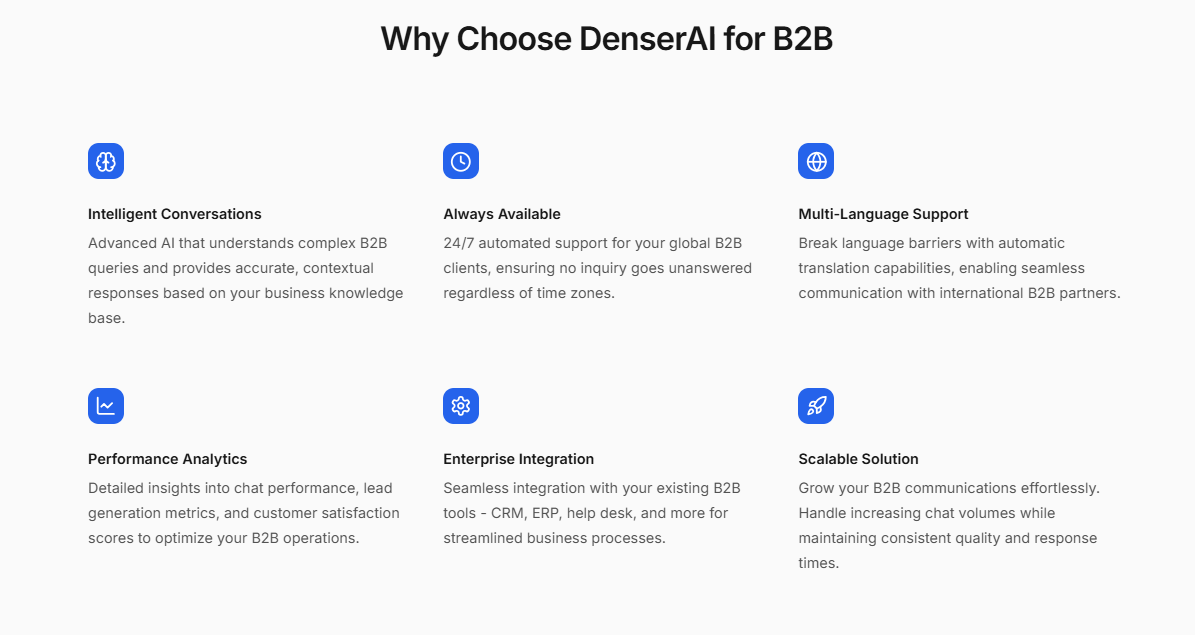
Don’t wait to upgrade your ecommerce business. Sign up for a free trial or schedule a demo today!
FAQs About AI Chatbot for Ecommerce#
Can chatbots be used for ecommerce?#
Chatbots are widely used in e-commerce to boost customer service, improve sales, and automate various processes. A well-designed AI chatbot platform for ecommerce can handle customer inquiries, recommend products, assist with checkout, and provide post-purchase support.
How can AI be used in ecommerce?#
AI boosts ecommerce sales by personalizing shopping experiences, offering instant responses, sending cart abandonment reminders, and improving inventory management. Conversational AI allows chatbots to engage customers naturally.
How to make a chatbot for an ecommerce website?#
Creating a chatbot for an ecommerce website involves a few key steps:
- Select an AI chatbot solution like Denser.ai, which supports ecommerce functionalities.
- Determine what tasks the chatbot should handle, such as answering questions, guiding purchases, or providing order updates.
- Connect the chatbot with platforms like Shopify, WooCommerce, or Magento for seamless interactions.
- Ensure it understands customer inquiries and can retrieve relevant information from your catalog.
- Monitor chatbot performance, collect feedback, and improve responses for better engagement.
What is the best AI chatbot for business?#
The best chatbot depends on business needs. Denser.ai offers advanced NLP, omnichannel integration, and scalable solutions for improving customer inquiries and ecommerce sales.